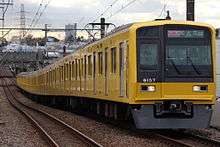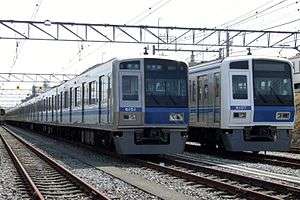Seibu 6000 series
| Seibu 6000 series | |
|---|---|
|
Aluminium body 6151 (left) and refurbished stainless steel body set 6107 (right) in March 2008 | |
| In service | 1992–Present |
| Refurbishment | 2006–2007 |
| Number built | 250 vehicles (25 sets) |
| Number in service | 250 vehicles (25 sets) |
| Formation | 10 cars per trainset |
| Operator(s) | Seibu Railway |
| Depot(s) | Kotesashi, Tamagawajosui |
| Line(s) served | Seibu Ikebukuro Line, Seibu Shinjuku Line, Seibu Yurakucho Line, Seibu Haijima Line, Seibu Sayama Line, Tokyo Metro Yurakucho Line, Tokyo Metro Fukutoshin Line |
| Specifications | |
| Car body construction | Stainless steel (6101 to 6117); Aluminium (6151 to 6158) |
| Car length | 20,000 mm (65 ft 7 in) |
| Doors | 4 pairs per side |
| Maximum speed | 105 km/h (on Seibu Line), 80 km/h (on Tokyo Metro lines) |
| Traction system | GTO-VVVF |
| Power output | 155 kW per motor |
| Acceleration | 3.3 km/h/s (on Tokyo Metro lines) |
| Electric system(s) | 1,500 V DC overhead |
| Braking system(s) | Electronically controlled pneumatic brakes with regenerative braking |
| Safety system(s) | ATC (beside 6101 and 6102), ATS (all sets) |
| Track gauge | 1,067 mm (3 ft 6 in) |
The Seibu 6000 series (西武6000系) is a Japanese electric multiple unit (EMU) train type operated by the private railway operator Seibu Railway on commuter services in the Tokyo area since 1992.[1]
Formations
As of 1 April 2014, the fleet consists of 25 10-car sets (numbered 6101 to 6117 and 6151 to 6158), formed as follows.[2]
| Car No. | 1 | 2 | 3 | 4 | 5 | 6 | 7 | 8 | 9 | 10 |
|---|---|---|---|---|---|---|---|---|---|---|
| Designation | Tc1 | M1 | M2 | T1 | M3 | M4 | T2 | M5 | M6 | Tc2 |
| Numbering | 6100 | 6200 | 6300 | 6400 | 6500 | 6600 | 6700 | 6800 | 6900 | 6000 |
Cars 2, 5, and 8 are each fitted with a lozenge-type pantograph.[2]
Interior
Passenger accommodation consists of longitudinal bench seating throughout. Some trains have two LCD passenger information screens above each door, some have LED scrolling displays.
 Interior view
Interior view
History
The first set was introduced in 1992 for inter-running with the Tokyo Metro Yurakucho Line. All sets are in 10-car fixed formations. Construction continued until 1998. Sets from 6156 onward were built with no door-pocket windows.[2]
Sets 6108 to 6117 and 6151 to 6158 include ATC for use on the Tokyo Metro Yurakucho Line and Seibu Yurakucho Line. Between 2006 and 2007, sets 6103 to 6107 were also modified with ATC for use on the Tokyo Metro Fukutoshin Line. These sets are distinguished by the addition of white front-end surrounds.[2]
 Refurbished stainless steel set 6103 in June 2008
Refurbished stainless steel set 6103 in June 2008- Refurbished aluminium set 6151 in March 2013
 Refurbished aluminium set 6158 in December 2011
Refurbished aluminium set 6158 in December 2011
Livery variations

From 18 April 2015, set 6157 was returned to service in a special all-over yellow livery to mark the 100th anniversary of the Seibu Ikebukuro Line. It is scheduled to carry this livery until March 2016.[3]
References
- ↑ 私鉄車両年鑑2012 [Japan Private Railways Annual 2012]. Tokyo, Japan: Ikaros Publications Ltd. February 2012. p. 181. ISBN 978-4-86320-549-9.
- 1 2 3 4 私鉄車両編成表 2014 [Private Railway Rolling Stock Formations - 2014] (in Japanese). Japan: Kotsu Shimbunsha. 24 July 2014. p. 55-57. ISBN 978-4-330-48414-3.
- ↑ 西武「黄色い6000系電車」運転開始 [Seibu "Yellow 6000 series" enters service]. Japan Railfan Magazine Online (in Japanese). Japan: Koyusha Co., Ltd. 19 April 2015. Retrieved 21 April 2015.
External links
| Wikimedia Commons has media related to Seibu 6000 series. |

